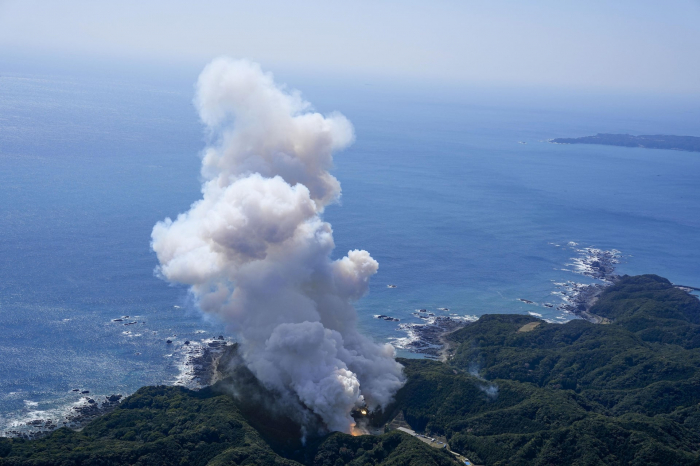Kairos, a small, solid-fuel rocket made by Japan's Space One, exploded just seconds into its inaugural launch on Wednesday as the firm tried to become the first Japanese company to put a satellite in orbit.
The setback for Space One and the rocket industry in Japan comes as the government and investors ramp up support for the sector amid a national security buildup and skyrocketing demand for commercial satellites.
The 18-metre (59 ft) rocket exploded five seconds after lifting off, leaving behind a large cloud of smoke, a fire, fragments of the rocket and sprays of firefighting water near the launch pad on the tip of mountainous Kii peninsula in western Japan, visible on local media livestreams.
"The rocket terminated the flight after judging that the achievement of its mission would be difficult," company president Masakazu Toyoda said.
Space One did not specify what triggered self-destruction after the first-stage engine ignited - or when the company would launch the next Kairos - only pledging an investigation into the explosion.
The company said that the launch is highly automated, requiring only about a dozen ground staff, and that the rocket self-destructs when it detects errors in its flight path, speed or control system that could cause a crash that endangers people on the ground.
"We don't use the world 'failure', because each trial brings us ... new data and experience for another challenge," Toyoda told a news conference.
There were no injuries near the launch pad, and the fire has been extinguished, Shuhei Kishimoto, governor of Wakayama prefecture, told reporters.
Kairos carried an experimental government satellite that can temporarily replace intelligence satellites in orbit if they fall offline.
Space One had planned the launch for Saturday but postponed it after a ship entered the nearby restricted sea area.
REVITALISING AN INDUSTRY
Partnering with the United States, Japan is seeking to revitalise its domestic aerospace industry to counter technological and military rivals China and Russia.
Last month, state-funded Japan Aerospace Exploration Agency (JAXA) successfully launched its new cost-efficient flagship rocket, the H3. JAXA completed a historic "pinpoint" moon landing this year, and the H3 is scheduled to carry about 20 satellites and probes to the space by 2030.
Before that, however, JAXA had faced a series of setbacks. H3's inaugural flight failed last year, as did another flight of a smaller rocket, Epsilon, in 2022. In July 2023, an upgraded engine for Epsilon exploded at JAXA's testing site.
In 2019, Interstellar Technologies conducted Japan's first privately developed rocket launch with its MOMO series, although without a full-scale satellite payload.
The government last year promised "comprehensive" support, opens new tab for space startups with technology critical for national security, as it seeks to build satellite constellations to ramp up intelligence capabilities.
Japan's defence ministry on Friday said it had struck a deal with Space One to boost its rockets' payload by experimenting with fuel-efficient methane engines.
"Rocket Lab, too, did not achieve its mission at the inaugural (Electron) flight, but it went on to launch three rockets in its second year," Toyoda said. "We can't stop here – we need to compete with this company."
More about:
















































